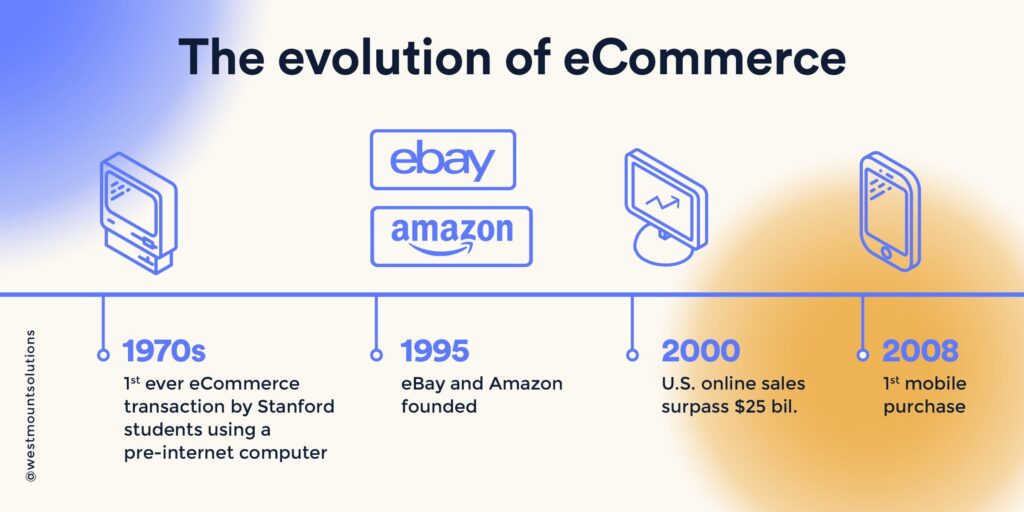The future of e-commerce is evolving at an unprecedented rate. As technology advances and consumer expectations shift, businesses must stay ahead by understanding and adopting the latest trends shaping the online shopping landscape. From AI in e-commerce to voice search in online shopping, this article explores the most influential trends that are defining the future of online business. By embracing these changes, companies can maintain a competitive edge and provide a more tailored, efficient, and sustainable shopping experience for consumers.
The Evolution of E-Commerce
E-commerce has come a long way since its inception, transforming from a novel way to shop into a primary channel for consumers worldwide. With the increasing penetration of the internet, the proliferation of smartphones, and advancements in payment technologies, online shopping is now a staple in the modern marketplace. This evolution has set the stage for emerging trends that will shape the future of e-commerce, demanding that businesses stay agile and forward-thinking. To remain competitive, companies must adapt to shifting consumer preferences, technological advancements, and global market trends.

AI in E-Commerce: Personalized Shopping Experiences
One of the most significant emerging e-commerce trends is the integration of AI in e-commerce. Artificial intelligence is revolutionizing the way consumers interact with online stores, offering personalized shopping experiences tailored to individual preferences. By analyzing customer data and behavior patterns, AI can recommend products, suggest customized offers, and predict future purchases. This level of customization improves customer satisfaction, leading to higher conversion rates and increased customer loyalty. In the future of e-commerce, AI will continue to play a crucial role in delivering tailored experiences that meet consumer needs.

Mobile Commerce: The Shift to Mobile-First Experiences
As mobile devices become an integral part of everyday life, mobile commerce or “m-commerce” is emerging as a dominant force in online shopping trends in 2024. With consumers increasingly preferring to shop on their smartphones and tablets, businesses must optimize their websites and platforms for mobile use. A mobile-first approach not only ensures a seamless shopping experience but also caters to the growing demand for convenience and speed in e-commerce. In the future of e-commerce, we can expect continued growth in mobile commerce, with features like one-click purchasing, mobile payment integration, and optimized checkout processes becoming the norm.

Augmented Reality Enhancing Online Shopping
Another exciting trend shaping the future of e-commerce is the use of augmented reality (AR) to enhance the online shopping experience. AR allows consumers to virtually try on products, visualize how items will look in their homes, or see how a piece of furniture fits in a space before making a purchase. This immersive technology bridges the gap between in-store and online shopping, providing consumers with a more interactive and confident shopping experience. As AR technology continues to improve, its integration into e-commerce platforms will be critical in driving engagement and increasing conversion rates.

Blockchain Technology in E-Commerce Security
The need for secure transactions is paramount in e-commerce, and blockchain technology is poised to revolutionize this aspect of the industry. By creating transparent and tamper-proof digital ledgers, blockchain enhances trust and security in online shopping. This technology not only safeguards consumer data but also ensures the authenticity of products and prevents fraud in the supply chain. As we move towards 2024 and beyond, blockchain will become a cornerstone of e-commerce security, offering businesses a way to build consumer trust and create more reliable, transparent processes.
With the rise of smart speakers and voice-activated devices, voice commerce is quickly becoming a significant trend in the future of e-commerce. Consumers are increasingly using voice commands to search for products, add items to their carts, and complete purchases. Voice search in online shopping is expected to grow rapidly, as it offers a hands-free, convenient shopping experience. Businesses must optimize their e-commerce platforms for voice search to stay ahead of this trend, ensuring that their products are easily discoverable through voice-activated systems. By doing so, they can tap into a new wave of consumers who prefer voice commerce for its ease of use and accessibility.

Sustainability in E-Commerce: Zero Waste and Green Practices
As environmental concerns become more prominent, consumers are increasingly seeking out businesses that adopt sustainable practices. The future of e-commerce will see a greater emphasis on sustainability and zero-waste models, as companies look to reduce their environmental footprint. From eco-friendly packaging to energy-efficient supply chains, businesses must integrate green practices into their operations to meet the growing demand for ethical shopping. Incorporating sustainability into e-commerce not only appeals to environmentally conscious consumers but also positions companies as responsible, forward-thinking brands in a competitive market.
Subscription Models: Boosting Customer Retention
In recent years, subscription models have gained popularity as a way to foster customer loyalty and drive recurring revenue. This trend is expected to continue shaping the future of e-commerce, as more businesses offer subscription-based services that provide consumers with convenience, exclusivity, and personalization. From monthly product boxes to streaming services, subscription models create long-term relationships between businesses and customers, increasing retention and reducing churn. By adopting this model, companies can secure consistent revenue streams and provide a tailored experience that keeps customers engaged over time.
Cross-Border E-Commerce: Expanding to Global Markets
The global nature of e-commerce presents immense opportunities for businesses looking to expand their reach. Cross-border e-commerce allows companies to tap into new markets, providing access to a broader audience and increasing revenue potential. However, expanding into global markets comes with its own set of challenges, including logistics, currency exchange, and cultural differences. To succeed in cross-border e-commerce, businesses must develop a strategy that addresses these challenges while capitalizing on the demand for international products. The future of e-commerce will see more companies embracing globalization, and using digital tools to navigate the complexities of international trade.
Data-Driven Insights: The Role of Analytics in E-Commerce Growth
In the future of e-commerce, data will play a critical role in shaping business strategies and driving growth. Data analytics allows businesses to understand consumer behavior, predict trends, and optimize their operations for maximum efficiency. By leveraging data-driven insights, companies can make informed decisions about inventory management, marketing strategies, and product development. As e-commerce automation becomes more prevalent, businesses will rely on analytics to enhance the customer experience, streamline processes, and increase profitability. E-commerce businesses that harness the power of data will be better positioned to meet the evolving demands of consumers.
Adapting to Changing Consumer Behavior
The behavior of consumers is constantly evolving, and businesses must adapt to these changes to stay relevant in the e-commerce landscape. In recent years, consumers have become more demanding in terms of convenience, personalization, and immediacy. The rise of omnichannel retail, where consumers expect a seamless experience across online and offline channels, has further complicated the shopping journey. To succeed in the future of e-commerce, businesses must embrace flexible, customer-centric strategies that cater to the needs and preferences of modern consumers. By doing so, they can build stronger relationships with their customers and stay ahead of the competition.
Future-Proofing E-Commerce: Trends to Watch
As the future of e-commerce continues to unfold, businesses must stay informed about the latest trends and technologies that will shape the industry. From AI in e-commerce to voice commerce and e-commerce automation, these emerging trends offer new opportunities for growth and innovation. To future-proof their businesses, companies should invest in the latest technologies, embrace sustainability, and remain flexible in the face of changing consumer behavior. By staying ahead of the curve, businesses can ensure long-term success in the ever-evolving world of e-commerce.






One thought on “The Future of E-Commerce: Trends Shaping Online Business”
Comments are closed.